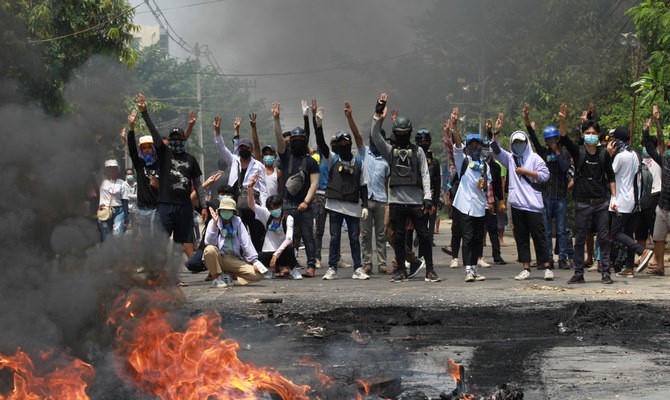
Myanmar continues in a free fall towards the abyss: the country, led since February 2021 by the criminal government of General Min Aung Hlaing, after the coup d’état that overthrew the elected government of Aung San Suu Kyi and repressed dissent with brutal violence, is increasingly in chaos. According to the report published by the Peace Research Institute in Oslo, over 6000 civilians have lost their lives in just twenty months, at least 3000 at the hands of the army, police and affiliated militias, 2000 at the hands of resistance groups against the coup[1] .
In a climate of constant human rights violations, on 28 March this year, the Union Electoral Commission of Myanmar, appointed by the military junta, decided to disband 40 political parties[2] , including that of Aung San Suu Kyi. Sky News, after sending some undercover correspondents on Myanmar soil[3] , stated with certainty that the military government targets civilians and resistance fighters using fighter planes[4] : air strikes against civilians are now the norm[5] : there were at least 600 air strikes by the military from February 2021 to January 2023. The junta has increased its air force, which now numbers at least 70 mostly Russian- and Chinese-made aircraft[6] , and uses the deadly ‘fuel-air’ munition, also called thermobaric or vacuum bomb, such as the one that killed more than 160 people, including many children, during a ceremony last May[7] .
All this was made possible by the weak reaction of the international community. While some large Japanese agribusiness and technology companies have left Myanmar, others (such as the South Koreans and Europeans) have made proclamations, which have not been followed by concrete facts. The regime then took efficient countermeasures: the families leading the army (the Tatmadaw) are the same ones who took over the reins of the economy and militarised the large industrial and commercial holdings (MEHL and MEC), which in the initial months of public resistance managed to survive and find alternative channels of marketing – once the war in Ukraine started, of course, any foreign intervention stopped working, and the Tatmadaw was able to concentrate its efforts on the physical suppression of internal dissent.
The only aid that is not lacking is war supplies: in early May of this year, the UN Special Rapporteur on the human rights situation in Myanmar, Tom Andrews, presented a detailed study on the arms trade in Myanmar, according to which[8] the government has imported more than a billion dollars’ worth of war equipment since taking office, despite bans and sanctions imposed by the international community.
Circumventing the bans are the Russian Federation (with 406 million dollars worth of supplies), China (267 million), Singapore (254 million), India (51 million) and Thailand (28 million)[9] : thus among the arms suppliers there are also countries that sit on the UN Security Council benches, iron allies of the USA and the West. The sanctions are easily circumvented through the use of shell companies created ad hoc by the military junta, with the complicity of banks that should instead apply the money transfer bans, such as those of Singapore, whose government has expressly declared itself in favour of respecting the sanctions, but in fact does not apply them[10] .
But there is no lack of good news: on 3 May, Myanmar’s military junta pardoned 2153 prisoners for dissent against the military. The pardon was granted on ‘humanitarian’ grounds on the occasion of a Buddhist holiday, but at least 17,000 people still remain imprisoned for the same offence. Yesterday (26 July), opposition leader Aung San Suu Kyi, sentenced by the junta to 33 years in prison for a huge number of charges, most of them simply ridiculous and non-existent, imposed by the junta in a trial behind closed doors, was transferred to house arrest after a year spent in solitary confinement.
The spiral of violence is in danger of escalating: media access to large parts of Myanmar is still impossible, making the real balance of the ongoing conflict largely obscure. The fight against resistance groups is increasingly technologically unequal, and the latter are in danger of getting the worst of it. The Chinese government, in view of the growing protection given by the Burmese to Chinese organised crime, promoted a meeting in late July between the Tatmadaw leader U Than Swe and the Chinese ambassador in Yangon, Chan Hai, to agree on Chinese military engagement against the regime’s opponents, who are equated with smugglers and criminals.
A very serious statement to which no one reacted. The assumption of a terrible escalation and slaughter, in the total absence of any commitment to an agreement by any of the actors involved. Except to fuel the exchange of war, of course.
[1] https://www.prio.org/news/3062
[2] https://www.consilium.europa.eu/it/press/press-releases/2023/03/29/myanmar-statement-by-the-high-representative-on-behalf-of-the-european-union-on-the-dissolution-of-democratic-political-parties/
[3] https://news.sky.com/video/special-programme-inside-myanmar-the-hidden-war-12924765
[4] https://news.sky.com/story/myanmar-categorically-rejects-claims-made-by-sky-news-about-the-civil-war-in-the-country-12927705
[5] https://www.bbc.com/news/world-asia-65238250
[6] https://www.bbc.com/news/world-asia-64397397
[7] https://apnews.com/article/myanmar-thermobaric-bombing-f1902357415217f46abceffab23f7995
[8] https://www.ohchr.org/sites/default/files/documents/countries/myanmar/infographic-sr-myanmar-2023-05-17.pdf
[9] https://www.ohchr.org/sites/default/files/documents/countries/myanmar/infographic-sr-myanmar-2023-05-17.pdf
[10] https://www.repubblica.it/solidarieta/emergenza/2023/05/22/news/myanmar_lesperto_delle_nazioni_unite_espone_un_commercio_di_morte_da_1_miliardo_di_dollari_allesercito_del_myanmar-401296318/
Leave a Reply